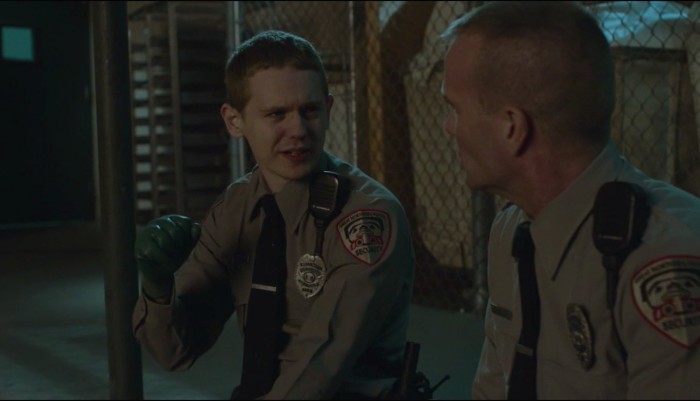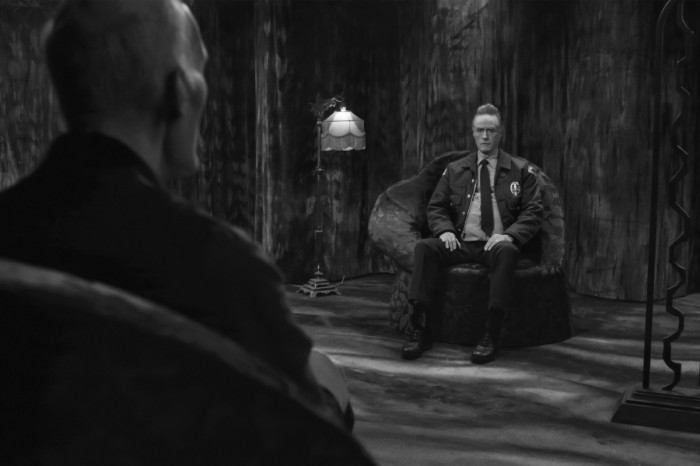'Twin Peaks: The Return' Review: Exploring The Best Moments Of Part 14
(Each week, we're going to kick off a discussion about Twin Peaks: The Return by answering one question: what was the best scene of the episode?)
After despising the past couple of episodes of Twin Peaks, the elusive series connected with me in a big way with last night's installment, trading narrative tangents and autuer-driven indulgences for a mythology-centric hour that made me breath a sigh of relief. Twin Peaks contains multitudes and part of its legend stems from the way it can represent many things to many people, but I'm partial to episodes like the one that aired last night, and I found it to be particularly satisfying – especially in the wake of what came before it.
Read our Twin Peaks part 14 review below.
The Best Scene in Part 14
For me, the best scene in this episode came toward its end: the part featuring the Great Northern Hotel security guards. It's James Hurley's birthday, so he asks his young new co-worker Freddie to tell him the story of why Freddie always wears a rubber glove on his right hand. Turns out he was sucked into a void and met the Giant, who instructed him to buy a very specific glove at a nearby store and that when he wore it, he would gain superhuman strength in that hand. (This isn't just nonsense, either: the glove works, as evidenced by Freddie destroying two walnuts between his fingers.) The Giant also told him to travel to the town of Twin Peaks to find his destiny, so I can't wait to see how he factors in to the remaining four hours of this season. Actor Jake Wardle, who plays Freddie, did a terrific job delivering what must have been a multi-page monologue, and in an episode full of great scenes and supernatural happenings, I was the most mesmerized by a simple scene of these two guys just sitting outside having a conversation.
But let's tackle this episode chronologically for the rest of this review. FBI chief Gordon Cole returns a call to the Twin Peaks Sheriff's Department, in which Frank Truman tells him they have reason to believe there are two Coopers out there. Cole's appreciative, and we quickly determine that this isn't the first time he's dealt with something like this. Albert's detailing of the first "Blue Rose" case to Tammy was illuminating: we learn that Cooper and DoppelCooper aren't the first to experience this strange doubling in the real world. Years before, FBI agents Cole and Philip Jeffries witnessed a double of a woman kill her counterpart, and the victim disappeared before their eyes. Sounds like some foreshadowing for a conflict between the two Coopers to me.
That scene is illuminating in an entirely different way as well: we find out that Cooper's former secretary Diane is related to Janey-E. The two are half-sisters, but they're estranged; I'm still thinking about what this connection could mean in terms of the larger story, but the idea that Diane is connected at all to the Dougie Jones storyline is a tidy way to tie those narrative threads together as the season heads toward its conclusion.
(Side note: I laughed so hard when the Las Vegas office chief suddenly screamed at his underling for seemingly no reason, slamming his fist on his desk. That reaction was totally out of left field, and one of those moments that could only work in the world of Twin Peaks.)
But the best aspect of the scene was the way he relayed his latest "Monica Bellucci dream" to Albert and Tammy in their makeshift office. The sound design has been terrific across The Return (I'm still trying to figure out what Lynch and Frost were trying to say with the squeaking window cleaner before Diane arrived), but it was especially effective this week, with the unnatural humming of electricity and ominous tonalities in key moments adding immeasurably to the scenes in which they appeared. Cole's dream – which, with its Parisian cafe setting, and self-awareness of dream logic is reminiscent of Inception – was not only beautifully filmed, edited, and executed, but it was one of the few recent scenes involving that character that wasn't oppressively tedious.
"We are like the dreamer who dreams, and then lives inside the dream," goes the ancient saying, and there are so many ways to read this that it's enough to make your head spin. My choice is to look at it as a meta commentary on Lynch and Frost's story they're weaving for us. It's no mistake that Cole, the character played by Lynch himself, uttered these words. To me, it means that not only are we the audience visiting Lynch and Frost's dream for an hour every week, but they too are living inside their own creation (and for Lynch as Cole, that connection is literal).
Cole's dream continued with a memory of a moment we saw back in Fire Walk With Me, in which Agent Phillip Jeffries (David Bowie) points at Cooper and asks Cole, "Who do you think that is, there?" (In the film, Jeffries also specifically mentions the idea of living inside a dream, deepening the link even further.) Did Jeffries know then that Cooper wasn't who he claimed to be? Was this moment destined to become fodder for Cole's dream years later, so the dots could finally be connected at the proper time? Cole, shaken from his recollections, gets meta once again. "Damn! I hadn't remembered that!" he says. "Now this is really something interesting to think about." That statement may as well be coming from those in the audience who didn't have Fire Walk With Me memorized, and are wondering about the various dream-within-dream connections that have been presented.
Back in Twin Peaks, the cops arrest Chad (the scumbag who worked with Richard Horne to intercept the letter from Miriam fingering Horne for the hit-and-run a few weeks ago) and head to the woods to visit the coordinates given to them by Major Briggs' secret message. There, they find Naido, the eyeless woman Cooper encountered during his travels through dimensions earlier this season. Last we saw her, she was standing with Coop on the roof of a building that floated through an endless expanse of stars, where she pulled a lever that gave her an electric shock and sent her careening through space. The cops find her naked in the woods, and at 2:53 pm, a vortex opens above her and sucks Deputy Andy into the Black Lodge.
Andy sits opposite the Giant, who now refers to himself as "the Fireman." (What's the significance of that name? Fire imagery has historically been an important part of this universe – even the movie's title, Fire Walk With Me, contains it – so maybe by taking the name of someone who attempts to combat fire, he's further cementing himself on the side of cosmic good?) While seated, Andy looks up at a portal above him and sees a collection of important sequences: the creature from the glass box, the birth of Bob, the woodsmen in the gas station, the "gotta light?" guy, Laura Palmer's high school photo flanked by angels, Naido on the ground outside, Cooper splitting into two distinct versions, a vision of Andy guiding Lucy to stand in a certain spot in the police station hallway, and the telephone pole marked with a number "6" that appears outside of Carl Rodd's trailer park (weirdly, it shows up outside the location in Fire Walk With Me, which is in Oregon, and in the new location in Twin Peaks, Washington).
Back outside the Lodge, Andy takes charge in a way we've never seen from him before, dropping his dopey speech patterns to tell the other cops they need to take Naido to a cell to protect her from those who want her dead. They do, but Chad and some other guy are in neighboring cells – and the latter is wounded, bleeding from the mouth, and prone to repeating anything he hears. I don't know if you have any theories, but I'm still trying to wrap my head around what we're supposed to glean from that guy.
Meanwhile, Sarah Palmer meanders into a bar and unwillingly draws the attention of patron who, after she rejects his advances, immediately turns threatening and abusive. This guy's a real piece of garbage – the embodiment of unearned entitlement – and after Sarah warns him to back off, she shows him her true self by pulling her own face off. And just as she promised, she takes a bite out of his throat and kills him right there in the bar. (Apparently nobody else witnessed this, and the bartender is suspicious of Sarah, but she doesn't seem to be too worried about it.) The way Sarah removed her face is just like how "Laura" showed Cooper her true self in the Black Lodge earlier this season. Sarah's perhaps the most disturbed character in this series, so while I can't exactly explain how she has this ability (maybe it has to do with her being a vessel for communication to Major Briggs in the season 2 finale?), it does make a certain amount of contextual sense for her to be different from everyone else.
And at the Roadhouse, through a conversation between two women, we finally learn the content of that enigmatic phone call that Audrey's husband Charlie had with someone named Tina a couple of weeks ago. (Remember? "It's unbelievable what you're telling me!") They chat about Billy, a missing person that many people (including Audrey, who had an affair with him) seem extremely worried about. One of these women in the bar is Tina's daughter, and she recounts the tale of seeing Billy for the last time: he jumped a fence into her yard, ran into their kitchen, and bled into their sink before tearing out the back door and running away again. Who the hell is Billy, and why do all of these people care so much about him? I hope we find out soon.
More than any other show I can think of, Twin Peaks is a multi-faceted series with fans who love completely different aspects of it and loathe others, often within the same episode. I'm certainly not suggesting that anyone else is watching the show incorrectly, but as someone who places huge value on narrative momentum, this episode was exactly what I needed to be pulled back into this strange, inexplicable world. Over the course of one hour, I got excited about Twin Peaks all over again.


